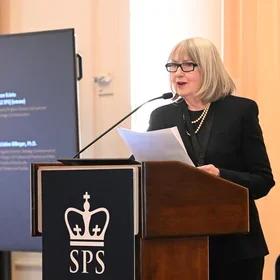On October 22, 2014 at Columbia University’s Faculty House, 92 prospective students gathered to hear from admissions directors from Columbia’s various schools including the School of Professional Studies, Columbia Business School, and the School of International and Public Affairs (SIPA).
The Columbia administrators discussed the attributes they seek in successful applicants to their top-tier programs and how best to demonstrate these qualities through one’s professional experience, supplemental essay, and recommendation letters.
Strengthen your application
Andie Hine, Executive Director of Enrollment Management at the School of Professional Studies, said that her team reviews applications from recent graduates as well as people who have graduated over five years ago and have spent a considerable amount of time in the workforce. Those in the latter category tend to worry about the relevance of their undergraduate majors or their academic performances. However, she said that, in those cases, “we’re looking for [relevant] professional experience.” Michael Robinson, Senior Associate Director of Admissions at Columbia Business School, agreed that GPA isn’t everything: “There’s no research that says that the person with the highest test scores or who got the best grades becomes the best leader.”
For those prospective students who are returning to school after a years-long absence who also lack relevant experience, Hine said, “We do recommend that they take a few classes in a non-degree program because they can use that experience to show that they have academic chops.”
Showcase relevant professional experience
The type of professional experience that Columbia seeks varies widely depending on the school and the program. For the School of Professional Studies, the program administrators outline the breadth and depth of work experience that they’re looking for on their respective program pages, so Hine recommends taking a closer look at the Who Should Apply section. She added, “We would like to see some evidence of your commitment to or interest in the particular area [of study].”
Robinson of Columbia Business School summed it up this way: “Regardless of your age and your level of experience, have you done something that will add learning value to the people around you?”
Highlight internships, volunteer work, and more
Hine said that full-time work is not the only way to demonstrate your experience in and commitment to a given field. One can also indicate a strong interest in a particular subject area with relevant internships, memberships in professional associations, and unpaid volunteer work.
Deanna Gregory, Senior Associate Director of Admissions at Teachers College, suggested, “Maybe you want to highlight that you were a leader in a student organization at an undergraduate institution.” She added, “For our international development program, did you study abroad as an undergrad?”
Write a unique supplemental essay
While some programs merely require a statement of academic purpose, others ask for a short, supplemental essay not unlike a personal statement for undergraduate applications. Hine offered the following advice: “Read the prompt.”
Prospective students often apply to multiple programs across several universities and reuse personal statements for each application. “We’re getting a lot of applications for our programs, so make sure that you’re being very thoughtful in communicating who you are.” She said, “For those programs for which [a supplemental essay] is required, it’s a very important part of what we look at.”
Seek substantive recommendation letters
Hine advises against asking the most prestigious professor you have had to write your recommendation letter – unless the instructor truly knows your work. “It’s really important that [the person writing the recommendation] can be specific about who you are and can talk about how appropriate you are for this specific program.”
In terms of the nuts and bolts of asking for a recommendation letter, she said, “Keep in mind the application deadline, and give them enough time to write the statement.” Prospective students should also prompt their recommenders and remind them which course they took, what projects or papers they submitted, and what they may have discussed outside the classroom. “Make sure that they’re reminded of who you are and the things that they potentially should be highlighting.”
Robinson of Columbia Business School implored prospective students to focus on the big picture. He said, “It’s not about marketing yourself in the best possible way but actually living a life of impact.” He added, “The thing about the best business schools is they don’t make people great; they just pick great people.”


